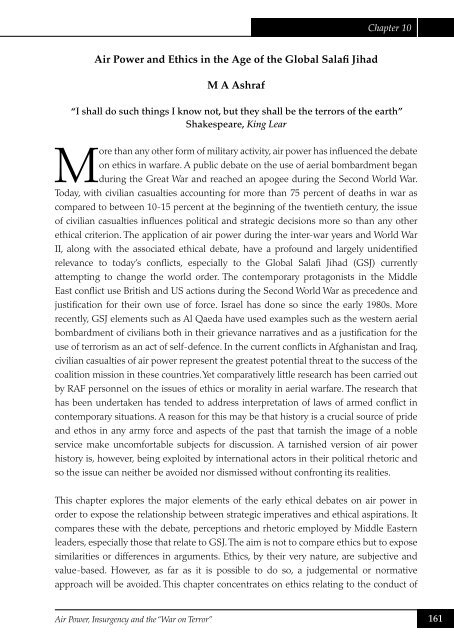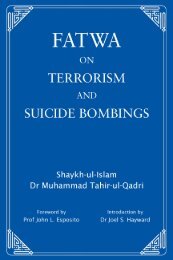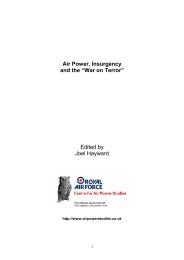Air Power, Insurgency and the âWar on Terrorâ - Prof. Joel Hayward's ...
Air Power, Insurgency and the âWar on Terrorâ - Prof. Joel Hayward's ...
Air Power, Insurgency and the âWar on Terrorâ - Prof. Joel Hayward's ...
Create successful ePaper yourself
Turn your PDF publications into a flip-book with our unique Google optimized e-Paper software.
Chapter 10<br />
<str<strong>on</strong>g>Air</str<strong>on</strong>g> <str<strong>on</strong>g>Power</str<strong>on</strong>g> <str<strong>on</strong>g>and</str<strong>on</strong>g> Ethics in <str<strong>on</strong>g>the</str<strong>on</strong>g> Age of <str<strong>on</strong>g>the</str<strong>on</strong>g> Global Salafi Jihad<br />
M A Ashraf<br />
“I shall do such things I know not, but <str<strong>on</strong>g>the</str<strong>on</strong>g>y shall be <str<strong>on</strong>g>the</str<strong>on</strong>g> terrors of <str<strong>on</strong>g>the</str<strong>on</strong>g> earth”<br />
Shakespeare, King Lear<br />
More than any o<str<strong>on</strong>g>the</str<strong>on</strong>g>r form of military activity, air power has influenced <str<strong>on</strong>g>the</str<strong>on</strong>g> debate<br />
<strong>on</strong> ethics in warfare. A public debate <strong>on</strong> <str<strong>on</strong>g>the</str<strong>on</strong>g> use of aerial bombardment began<br />
during <str<strong>on</strong>g>the</str<strong>on</strong>g> Great War <str<strong>on</strong>g>and</str<strong>on</strong>g> reached an apogee during <str<strong>on</strong>g>the</str<strong>on</strong>g> Sec<strong>on</strong>d World War.<br />
Today, with civilian casualties accounting for more than 75 percent of deaths in war as<br />
compared to between 10-15 percent at <str<strong>on</strong>g>the</str<strong>on</strong>g> beginning of <str<strong>on</strong>g>the</str<strong>on</strong>g> twentieth century, <str<strong>on</strong>g>the</str<strong>on</strong>g> issue<br />
of civilian casualties influences political <str<strong>on</strong>g>and</str<strong>on</strong>g> strategic decisi<strong>on</strong>s more so than any o<str<strong>on</strong>g>the</str<strong>on</strong>g>r<br />
ethical criteri<strong>on</strong>. The applicati<strong>on</strong> of air power during <str<strong>on</strong>g>the</str<strong>on</strong>g> inter-war years <str<strong>on</strong>g>and</str<strong>on</strong>g> World War<br />
II, al<strong>on</strong>g with <str<strong>on</strong>g>the</str<strong>on</strong>g> associated ethical debate, have a profound <str<strong>on</strong>g>and</str<strong>on</strong>g> largely unidentified<br />
relevance to today’s c<strong>on</strong>flicts, especially to <str<strong>on</strong>g>the</str<strong>on</strong>g> Global Salafi Jihad (GSJ) currently<br />
attempting to change <str<strong>on</strong>g>the</str<strong>on</strong>g> world order. The c<strong>on</strong>temporary protag<strong>on</strong>ists in <str<strong>on</strong>g>the</str<strong>on</strong>g> Middle<br />
East c<strong>on</strong>flict use British <str<strong>on</strong>g>and</str<strong>on</strong>g> US acti<strong>on</strong>s during <str<strong>on</strong>g>the</str<strong>on</strong>g> Sec<strong>on</strong>d World War as precedence <str<strong>on</strong>g>and</str<strong>on</strong>g><br />
justificati<strong>on</strong> for <str<strong>on</strong>g>the</str<strong>on</strong>g>ir own use of force. Israel has d<strong>on</strong>e so since <str<strong>on</strong>g>the</str<strong>on</strong>g> early 1980s. More<br />
recently, GSJ elements such as Al Qaeda have used examples such as <str<strong>on</strong>g>the</str<strong>on</strong>g> western aerial<br />
bombardment of civilians both in <str<strong>on</strong>g>the</str<strong>on</strong>g>ir grievance narratives <str<strong>on</strong>g>and</str<strong>on</strong>g> as a justificati<strong>on</strong> for <str<strong>on</strong>g>the</str<strong>on</strong>g><br />
use of terrorism as an act of self-defence. In <str<strong>on</strong>g>the</str<strong>on</strong>g> current c<strong>on</strong>flicts in Afghanistan <str<strong>on</strong>g>and</str<strong>on</strong>g> Iraq,<br />
civilian casualties of air power represent <str<strong>on</strong>g>the</str<strong>on</strong>g> greatest potential threat to <str<strong>on</strong>g>the</str<strong>on</strong>g> success of <str<strong>on</strong>g>the</str<strong>on</strong>g><br />
coaliti<strong>on</strong> missi<strong>on</strong> in <str<strong>on</strong>g>the</str<strong>on</strong>g>se countries. Yet comparatively little research has been carried out<br />
by RAF pers<strong>on</strong>nel <strong>on</strong> <str<strong>on</strong>g>the</str<strong>on</strong>g> issues of ethics or morality in aerial warfare. The research that<br />
has been undertaken has tended to address interpretati<strong>on</strong> of laws of armed c<strong>on</strong>flict in<br />
c<strong>on</strong>temporary situati<strong>on</strong>s. A reas<strong>on</strong> for this may be that history is a crucial source of pride<br />
<str<strong>on</strong>g>and</str<strong>on</strong>g> ethos in any army force <str<strong>on</strong>g>and</str<strong>on</strong>g> aspects of <str<strong>on</strong>g>the</str<strong>on</strong>g> past that tarnish <str<strong>on</strong>g>the</str<strong>on</strong>g> image of a noble<br />
service make uncomfortable subjects for discussi<strong>on</strong>. A tarnished versi<strong>on</strong> of air power<br />
history is, however, being exploited by internati<strong>on</strong>al actors in <str<strong>on</strong>g>the</str<strong>on</strong>g>ir political rhetoric <str<strong>on</strong>g>and</str<strong>on</strong>g><br />
so <str<strong>on</strong>g>the</str<strong>on</strong>g> issue can nei<str<strong>on</strong>g>the</str<strong>on</strong>g>r be avoided nor dismissed without c<strong>on</strong>fr<strong>on</strong>ting its realities.<br />
This chapter explores <str<strong>on</strong>g>the</str<strong>on</strong>g> major elements of <str<strong>on</strong>g>the</str<strong>on</strong>g> early ethical debates <strong>on</strong> air power in<br />
order to expose <str<strong>on</strong>g>the</str<strong>on</strong>g> relati<strong>on</strong>ship between strategic imperatives <str<strong>on</strong>g>and</str<strong>on</strong>g> ethical aspirati<strong>on</strong>s. It<br />
compares <str<strong>on</strong>g>the</str<strong>on</strong>g>se with <str<strong>on</strong>g>the</str<strong>on</strong>g> debate, percepti<strong>on</strong>s <str<strong>on</strong>g>and</str<strong>on</strong>g> rhetoric employed by Middle Eastern<br />
leaders, especially those that relate to GSJ. The aim is not to compare ethics but to expose<br />
similarities or differences in arguments. Ethics, by <str<strong>on</strong>g>the</str<strong>on</strong>g>ir very nature, are subjective <str<strong>on</strong>g>and</str<strong>on</strong>g><br />
value-based. However, as far as it is possible to do so, a judgemental or normative<br />
approach will be avoided. This chapter c<strong>on</strong>centrates <strong>on</strong> ethics relating to <str<strong>on</strong>g>the</str<strong>on</strong>g> c<strong>on</strong>duct of<br />
<str<strong>on</strong>g>Air</str<strong>on</strong>g> <str<strong>on</strong>g>Power</str<strong>on</strong>g>, <str<strong>on</strong>g>Insurgency</str<strong>on</strong>g> <str<strong>on</strong>g>and</str<strong>on</strong>g> <str<strong>on</strong>g>the</str<strong>on</strong>g> “War <strong>on</strong> Terror” 161





